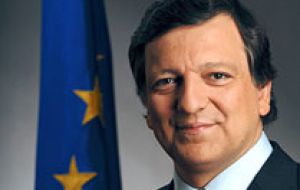MercoPress. South Atlantic News Agency
Higher rates expected as Euro inflation doubles ECB target
 Barroso happy with the strong Euro
Barroso happy with the strong Euro Surging fuel food prices drove Euro zone inflation in June to 4%, (from 3.7% in May) more than double the European Central Bank target and the highest since measurements began in 1997, according to the latest release from the EU statistics office Eurostat.
A 16% year-on-year rise in energy costs as oil prices headed above 140 US dollars a barrel was to blame, Eurostat said. Food prices rose 0.2% on the month and 6.4% year-on-year - the same rate as in May. The ECB target for inflation growth is about 2%, but rising food and fuel prices are making it difficult for the central bank to bring inflation back to this level. ECB raised interest rates to 4.25% from 4%, at the start of the month to try to contain inflation and despite evidence Euro zone economic growth is decelerating. Economists expect the ECB will have to raise rates once or twice more before inflation is under control as the higher food and fuel prices trigger rises in other sectors and faster wage growth - the so-called second round inflation effects. Without energy and unprocessed food costs, what ECB calls core inflation prices grew 0.1% month-on-month and 2.5% year-on-year, again the same rate as in May. With the Euro hitting an all time record against the US dollar, European Commission President Jose Manuel Barroso said the European currency has helped curb inflation. "The Euro has been a good cushion against inflationary pressures, above all from high oil prices," Barroso told the Italian parliament in Rome when asked to comment on the Euro strength.




Top Comments
Disclaimer & comment rulesCommenting for this story is now closed.
If you have a Facebook account, become a fan and comment on our Facebook Page!